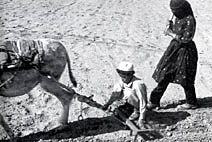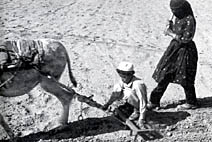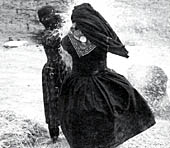
Upgrading Lot of Rural Women [Archives:1999/02/Reportage]
January 11 1999
Yemeni women play an important role in traditional farming, shouldering most of the burden in agricultural work all the year long. Men work only in ploughing and harvesting seasons. Despite such big role, women are belittled due to economic, social, legal and cultural obstacles that limit the return to their work. That means that there are structural hindrances that prevent rural women from being an effective partner in the development process and in social change.

There is a negative co-relation between women’s hard work on the farm and their economic situation within the family and society. In spite of being the largest producer, women have the least access to the family income generated from the farm and raising livestock.
This already unfair situation for women is further exacerbated by other factors. Consider, as examples, the following:
Sex Discrimination: Girls are compelled to stay at home and do chores or help with livestock (e.g., miling cows, goats, herding, etc.) or on the farm, while boys go to school or play outside.

Cash Crops: There is a general rule which says that women do not work on cash crops, such as qat, grapes, coffee, etc. The idea behind it is that if women hand their hands on the cash crop, they could have their hands on the money.
Exceptions to the rule are Lahj, Abyan, the Tihama, and the women of Jabal Sabir in Taiz.
If we take maize and sorghum as examples, in their capacity as the largest crops grown in Yemen, we notice that women do the work in planting, weeding, harvesting, sifting, collecting roots, fertilizing lands and work with men in ploughing.
If we also take cotton as another example, men only do the ploughing and seeding operations, which take a relatively short period, while women do the cleaning of the land from weeds, collecting cotton, packing it and cleaning the land from the harvest’s remains. Their work extends from August through February the following year.
Women in the countryside perform all household chores such as cleaning the house, carrying water, washing clothes, baking bread, looking after the children, etc. They are also responsible for animal husbandry in addition sewing clothes and even limited construction work.
The gravity of the situation becomes clear when we remember that women get the least of the household income and benefits. In our culture, whatever limited good food exists, goes to the men and boys. Women get meat, milk, eggs, etc., only if any of it is left behind.
So, how do we help the lot of women? We have to address this inequity and these bad socio- cultural values. We have to address the issues head-on.
By: Engineer Balqis Anwar Abdul Sattar,
Director of Upgrading Rural Women Department,
Ministry of Agriculture.
——
[archive-e:02-v:1999-y:1999-d:1999-01-11-p:./1999/iss02/report.htm]


